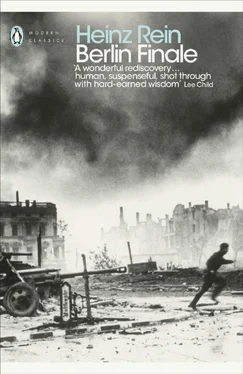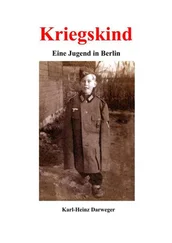So why did she come to his assistance? Just out of human kindness, pity, goodness? In the few years during which he has had to rely on himself, Lassehn has met no one who possessed these qualities, instead he has only ever encountered harshness, selfishness and suspicion. Every man seemed to be an island, an island without a beach on which a strange boat could wash up. And now, two days in a row, two complete strangers have taken him under their wings, a pub landlord from Silesian Station and a concierge from Charlottenburg, strange parallelism of events. Do they allow us to draw conclusions about the people of this city?
Lassehn looks around from under lowered eyelids. The fear has fled a little from people’s faces, at intervals you can still hear the deep growl of the four-propeller engines, but there are no more explosions, the unbelievable tension of the first fifteen minutes, when bomb after bomb was falling nearby, when everyone clutched their bags more tightly as they prepared to jump, ready to push anyone ruthlessly aside to get to the exit, has now dissolved into effervescent chattiness, into small activities that smack of nervousness.
Relationships between people, which had recently been close to hostility, become conciliatory again, neighbours who are rivals in the struggle for life reacquire more human features, but it’s all a thin layer of plaster.
If the bomber squadron dropped another series of bombs nearby, that plaster would fall away immediately, revealing the wild instincts beneath. But wave after wave of planes flies over the western part of the city without dropping anything, and from the announcements on the police radio station it is soon clear that the bombers are already flying away, which makes it very unlikely that bombs will be dropped. The greater the distance between the city and the departing squadrons, the more human the faces become, and occasional laughter can even be heard ringing out in the cellar. Even though it is clear that the Americans can fly large raids every day, and even though nothing is more certain than the nocturnal attack of several dozen British mosquitoes, people know they have been spared for now, they believe that the unbearable burden placed upon them has been lifted, and that awareness revives them. It allows them to make plans for the next few hours, even to arrange to meet and go to the cinema that evening. As incredible as it seems, in half-dilapidated houses, in streets blocked by rubble and anti-tank barriers, the cinemas are still operating, they reel out their performances during the few hours when the electricity ban is lifted, but even then they are seldom able to show the whole programme all at once uninterrupted because the phrases of the newsreel announcers and the chatter of the shadows on the screen are drowned out by the sirens. Lassehn knows that as the spirits of life revive, interest will be focused on him once more, and since he feels no great need to clash again with air-raid warden Exner, he gets to his feet and walks with a swinging stride and in a deliberately casual posture, not too quickly, but not too slowly either, towards the exit.
‘I’m going out for a cig,’ he says to Mrs Buschkamp as he walks by.
Some men are standing smoking in the room just outside the cellar, and with a fleeting glance Lassehn sees that Exner is engaged in animated conversation with a big man in a brown Party uniform. Everything in him urges him to flee as swiftly as possible, but he controls himself, he only quickens his step a little, and only when the twists of the cellar stairs have hidden him from view does he charge up the steps, push open the cellar door and stand in the courtyard. A cloudless blue sky stretches over the great gap surrounded by houses, it is very quiet, a deep peace has settled over the big city at midday, as people dart like rats down underground passageways.
In the hallway Lassehn lights a cigarette and draws the smoke deep into his lungs. Should he go now? He only came here to see his wife, to talk to her, to consider the possibility of their living together, of finding a place to live, until… yes, until when?
Lassehn steps outside the front door. The street has been emptied, as if a magnet had sucked all the life from it, he looks along Kaiser-Friedrich-Strasse, towards the north-east there hangs a dark, greyish-black wall of cloud, slowly rising into the sky.
Strange weather, he thinks, it’s a spring sky, light blue with a bright sun, small, white clouds, and beyond it the dark-grey, threatening bank of storm cloud which whirls and seethes and twitches, and there is no wind, hardly a breeze. Strange weather! But suddenly an icy feeling of terror runs through him. The thing that is rising over there is not a storm cloud, that is smoke and haze, desolation and destruction, death and ruin, that is the terrible trail of war which now stretches from Egypt and the Kazakh Steppe, from Narvik and Crete to Berlin. So that’s what it looks like. While only sideswipes fell here, over there the full, targeted force of the bombers came raining down.
Lassehn gives a start when the front door opens behind him. His hand immediately reaches for the revolver in his trouser pocket, these days it has become an entirely instinctive movement, but he quickly puts the revolver back and is almost a little ashamed. Mrs Buschkamp has stepped outside.
‘Ah, it’s you,’ Lassehn says.
‘Yes, it’s me,’ says Mrs Buschkamp. ‘What are you doing standing outside the front door? Do you want the Party bigwigs to come after you?’
‘I’m just thinking about something,’ Lassehn says.
‘But not in the street,’ Mrs Buschkamp says firmly. ‘Too much air in your belly? Or do you want them to hang you?’
Lassehn shakes his head, he’s almost irritated, the woman’s care and attention are nearly becoming a little too much. ‘Look over there,’ he says by way of distraction, and points towards the threatening cloud.
‘That’s nothing new, I don’t even bother looking at that any more,’ Mrs Buschkamp says. ‘We’ve all been through it all, and I’ve even been in the middle of one of those, nothing bothers us these days. But now…’
Sirens cut three long, harsh notes into the deadly silence that spreads like a shroud over the city.
‘All clear,’ Mrs Buschkamp says. ‘Well, you’ve got away with it again.’
‘It’s all a matter of luck,’ Lassehn says, for the sake of saying something.
Mrs Buschkamp looks at him with quick, appraising eyes.
‘Come to mine first,’ she says. ‘Be quick, before the others creep out of the cellar.’
Lassehn follows her hesitantly.
‘Thank you,’ he says, when he is sitting opposite her in the concierge’s lodge.
‘It’s fine,’ Mrs Buschkamp waves the idea away, ‘I don’t want anything in return.’
‘Why have you done this?’ Lassehn asks. ‘You don’t even know me.’
Mrs Buschkamp looks at him thoughtfully. ‘Do you need to know someone to pull him out of the water?’ she asks.
‘No,’ Lassehn admits, ‘but you had no reason…’
‘Save your breath, lad,’ Mrs Buschkamp exclaims angrily. ‘Are you saying you would have let me perish?’
‘I don’t know,’ Lassehn says honestly. ‘Damn it all,’ he says, tearing furiously into himself. ‘You’re quite right, if you’re indirectly reproaching me, Mrs Buschkamp, this Nazi system which supposedly trains up everyone to be a hero and a dragon killer has in fact turned us all into pitiful cowards, cringers before any shit-brown uniform, toadies at the sight of every piece of enamel. All humanity in us has been suffocated, all individuality flattened out, and if humanity in Germany has not quite died out, it’s only because the bastards haven’t yet had time to squeeze the little remaining decency and justice out of us.’ Lassehn is amazed by his own outburst, but he feels liberated, and somewhat justified in the face of this clear-eyed old woman.
Читать дальше












